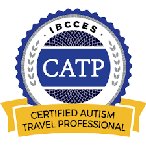


🐕🦺 TRAVEL WITH A SERVICE DOG & ALL ABOUT TASHA
The World is Now More Accessible Than Ever – Explore and Enjoy It!

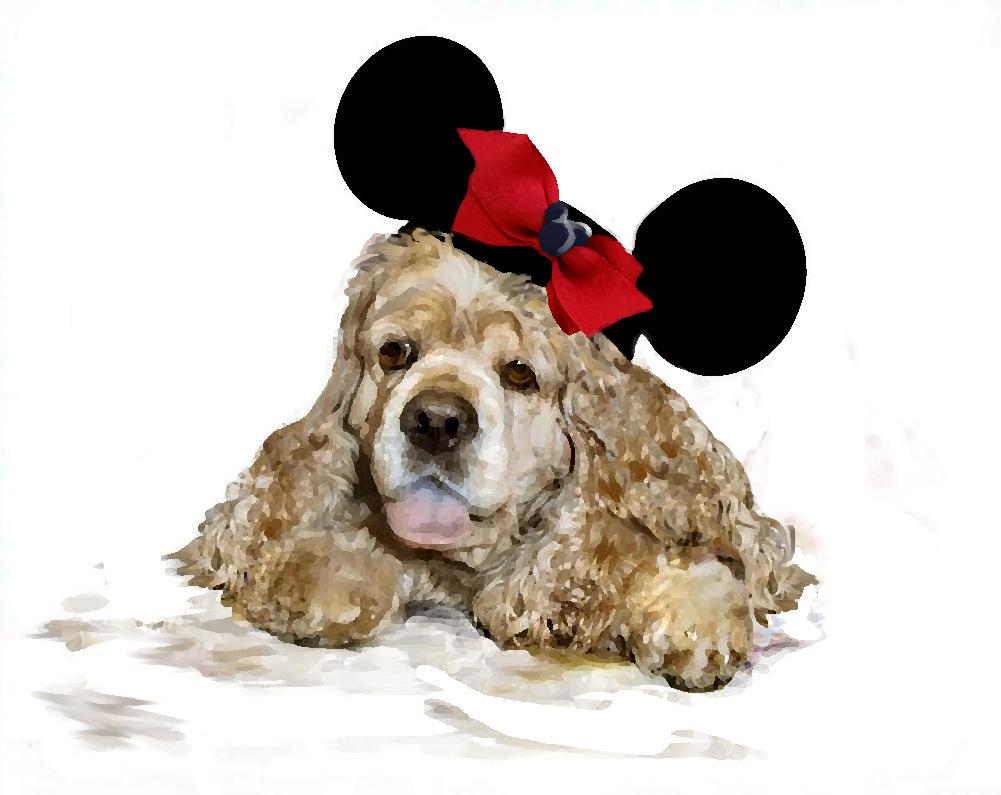 Embrace the freedom of travel; it is within your grasp! From cherished family visits across the United States to global escapades, we make your travel dreams possible. Sure, it requires devoted planning - but with us by your side, it's not only achievable, it's exciting! Similar to your essential travel documents, your service dog too needs their paperwork. We are thrilled to assist you in procuring an exclusive 'Pet Passport' for your furry assistant. Let's be clear - the process may pose challenges as various countries operate under differing rules and guidelines, subject to periodic changes. Nevertheless, towering over these obstacles is our resource rich team, armed with immense knowledge to lend you the necessary support. With us, every stumbling block turns into a stepping stone towards your dream journey.
Embrace the freedom of travel; it is within your grasp! From cherished family visits across the United States to global escapades, we make your travel dreams possible. Sure, it requires devoted planning - but with us by your side, it's not only achievable, it's exciting! Similar to your essential travel documents, your service dog too needs their paperwork. We are thrilled to assist you in procuring an exclusive 'Pet Passport' for your furry assistant. Let's be clear - the process may pose challenges as various countries operate under differing rules and guidelines, subject to periodic changes. Nevertheless, towering over these obstacles is our resource rich team, armed with immense knowledge to lend you the necessary support. With us, every stumbling block turns into a stepping stone towards your dream journey.
Venturing abroad with your pet? Proactive and comprehensive planning is the cornerstone to bypassing hurdles upon entry into any foreign territory. Bearing in mind, pet import rules are tailored uniquely for each nation worldwide. It's imperative for pet owners to familiarize themselves with these regulations in advance, thereby providing a smooth experience even in countries necessitating pet quarantine procedures. Crafting a pet passport, a comprehensive portfolio encompassing all essential documents for admittance into the destination country, is a must. A keen understanding of pet import regulations assures you a safer, seamless, and pleasant journey with your pet
United States ~ Americans with Disabilities Act
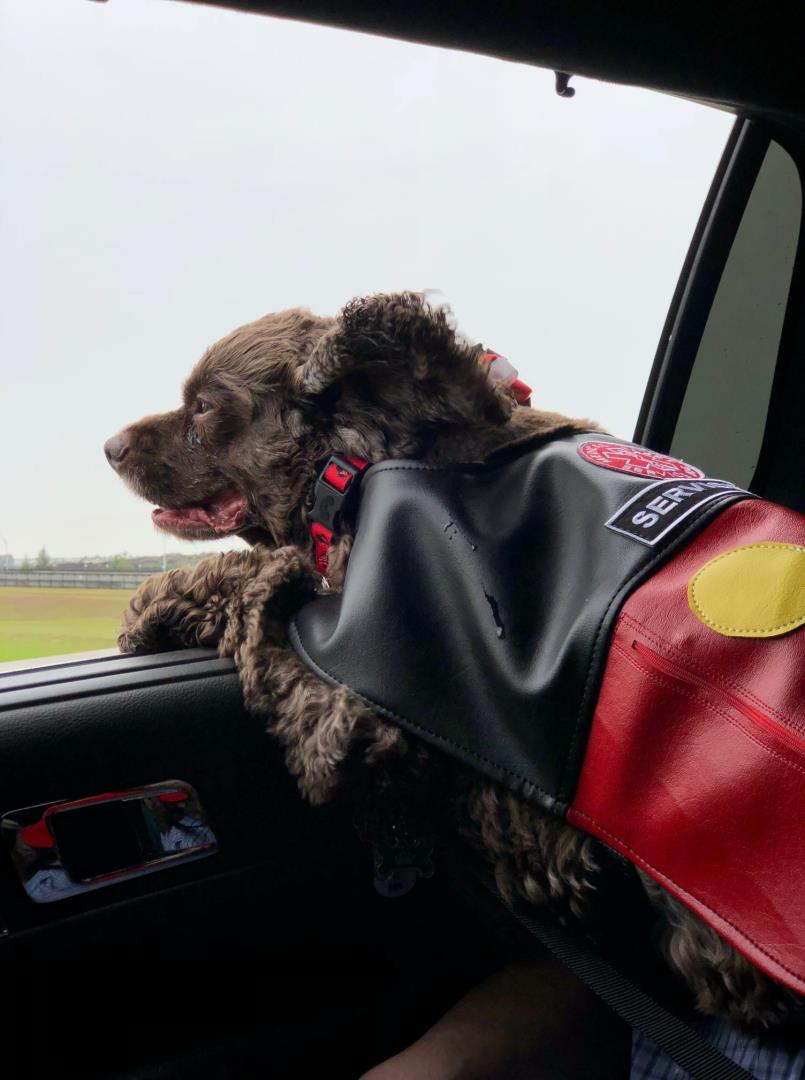 Within the United States, the Department of Justice published revised final regulations implementing the Americans with Disabilities Act (ADA) for title II (State and local government services) and title III (public accommodations and commercial facilities) on September 15, 2010, in the Federal Register. These requirements, or rules, clarify and refine issues that have arisen over the past 20 years and contain new, and updated, requirements, including the 2010 Standards for Accessible Design (2010 Standards).
Within the United States, the Department of Justice published revised final regulations implementing the Americans with Disabilities Act (ADA) for title II (State and local government services) and title III (public accommodations and commercial facilities) on September 15, 2010, in the Federal Register. These requirements, or rules, clarify and refine issues that have arisen over the past 20 years and contain new, and updated, requirements, including the 2010 Standards for Accessible Design (2010 Standards).
Beginning on March 15, 2011, only dogs are recognized as service animals under titles II and III of the ADA.
A service animal is a dog that is individually trained to do work or perform tasks for a person with a disability.
Generally, title II and title III entities must permit service animals to accompany people with disabilities in all areas where members of the public are allowed to go.
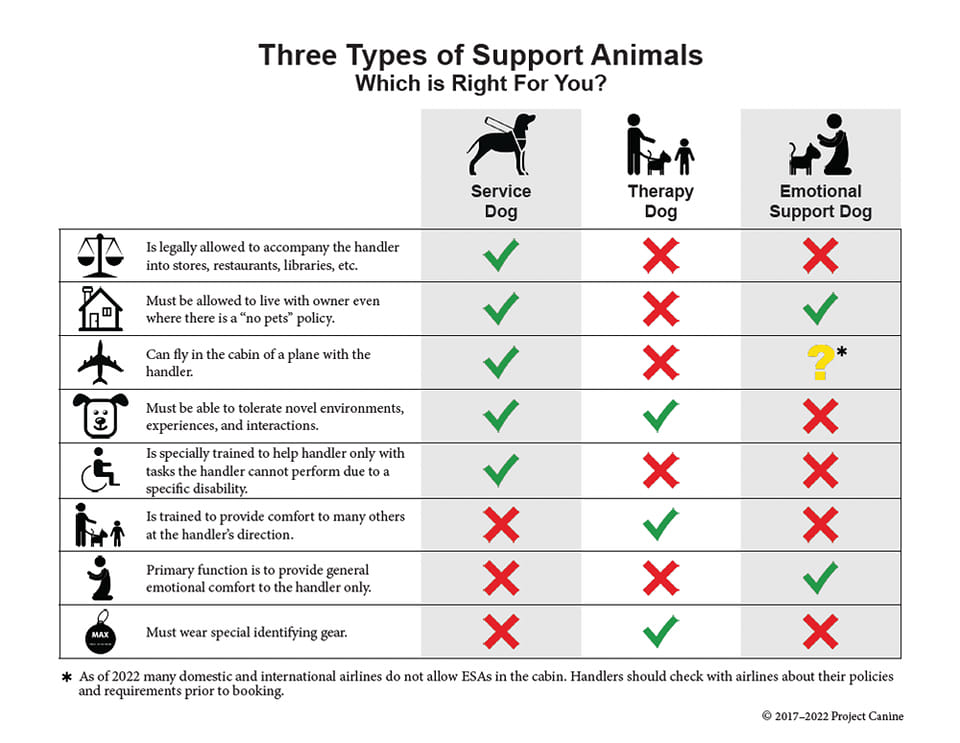
🐕🦺 Fake Service Dog And How “Service Animal” Is Defined
Service animals are defined as dogs that are individually trained to do work or perform tasks for people with disabilities. Examples of such work or tasks include guiding people who are blind, alerting people who are deaf, pulling a wheelchair, alerting and protecting a person who is having a seizure, reminding a person with mental illness to take prescribed medications, calming a person with Post Traumatic Stress Disorder (PTSD) during an anxiety attack, or performing other duties. Service animals are working animals, not pets. The work or task a dog has been trained to provide must be directly related to the person’s disability. Dogs whose sole function is to provide comfort or emotional support do not qualify as service animals under the ADA.
This definition does not affect or limit the broader definition of “assistance animal” under the Fair Housing Act or the broader definition of “service animal” under the Air Carrier Access Act. Some State and local laws also define service animals more broadly than the ADA does. Information about such laws can be obtained from the State attorney general’s office.
🐕🦺Where Service Animals Are Allowed
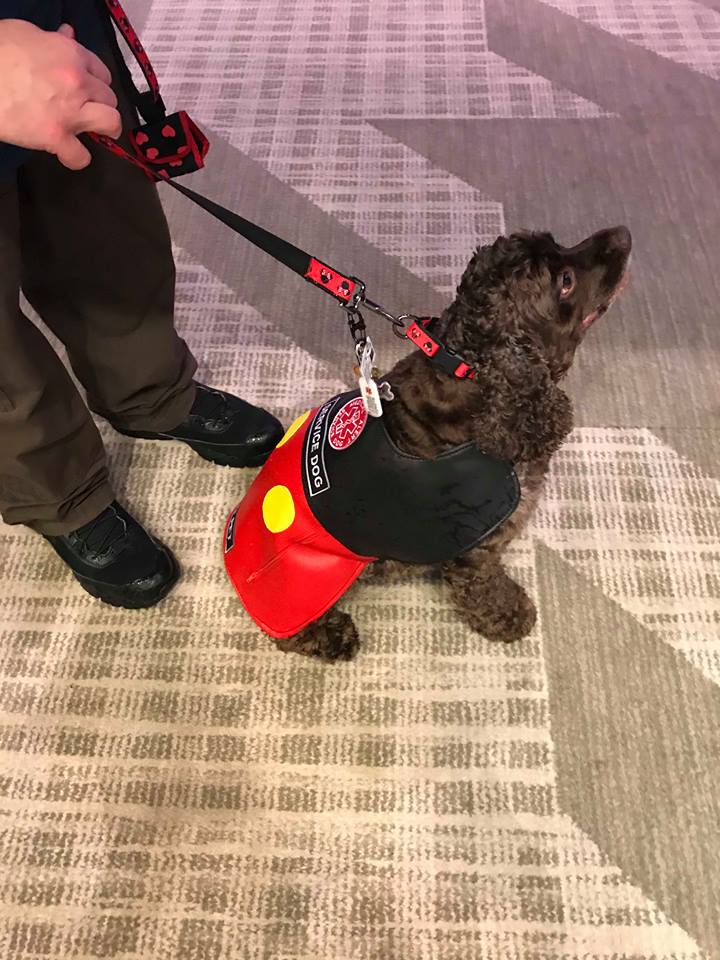 Under the ADA, State and local governments, businesses, and nonprofit organizations that serve the public generally must allow service animals to accompany people with disabilities in all areas of the facility where the public is normally allowed to go. For example, in a hospital, it would be inappropriate to exclude a service animal from areas such as patient rooms, clinics, cafeterias, or examination rooms. However, it may be appropriate to exclude a service animal from operating rooms or burn units where the animal’s presence may compromise a sterile environment.
Under the ADA, State and local governments, businesses, and nonprofit organizations that serve the public generally must allow service animals to accompany people with disabilities in all areas of the facility where the public is normally allowed to go. For example, in a hospital, it would be inappropriate to exclude a service animal from areas such as patient rooms, clinics, cafeterias, or examination rooms. However, it may be appropriate to exclude a service animal from operating rooms or burn units where the animal’s presence may compromise a sterile environment.
🐕🦺Service Animals Must Be Under Control
Under the ADA, service animals must be harnessed, leashed, or tethered, unless these devices interfere with the service animal’s work or the individual’s disability prevents using these devices. In that case, the individual must maintain control of the animal through voice, signal, or other effective controls.
🐕🦺Inquiries, Exclusions, Charges, and Other Specific Rules Related to Service Animals
When it is not obvious what service an animal provides, only limited inquiries are allowed. Staff may ask two questions: (1) is the dog a service animal required because of a disability, and (2) what work or task has the dog been trained to perform? Staff cannot ask about the person’s disability, require medical documentation, require a special identification card or training documentation for the dog, or ask that the dog demonstrate its ability to perform the work or task.
Allergies and fear of dogs are not valid reasons for denying access or refusing service to people using service animals. When a person who is allergic to dog dander and a person who uses a service animal must spend time in the same room or facility, for example, in a school classroom or at a homeless shelter, they both should be accommodated by assigning them, if possible, to different locations within the room or different rooms in the facility.
A person with a disability cannot be asked to remove his service animal from the premises unless:
(1) the dog is out of control and the handler does not take effective action to control it.
(2) the dog is not housebroken. When there is a legitimate reason to ask that a service animal be removed, staff must offer the person with the disability the opportunity to obtain goods or services without the animal’s presence.
Establishments that sell or prepare food must allow service animals in public areas even if state or local health codes prohibit animals on the premises.
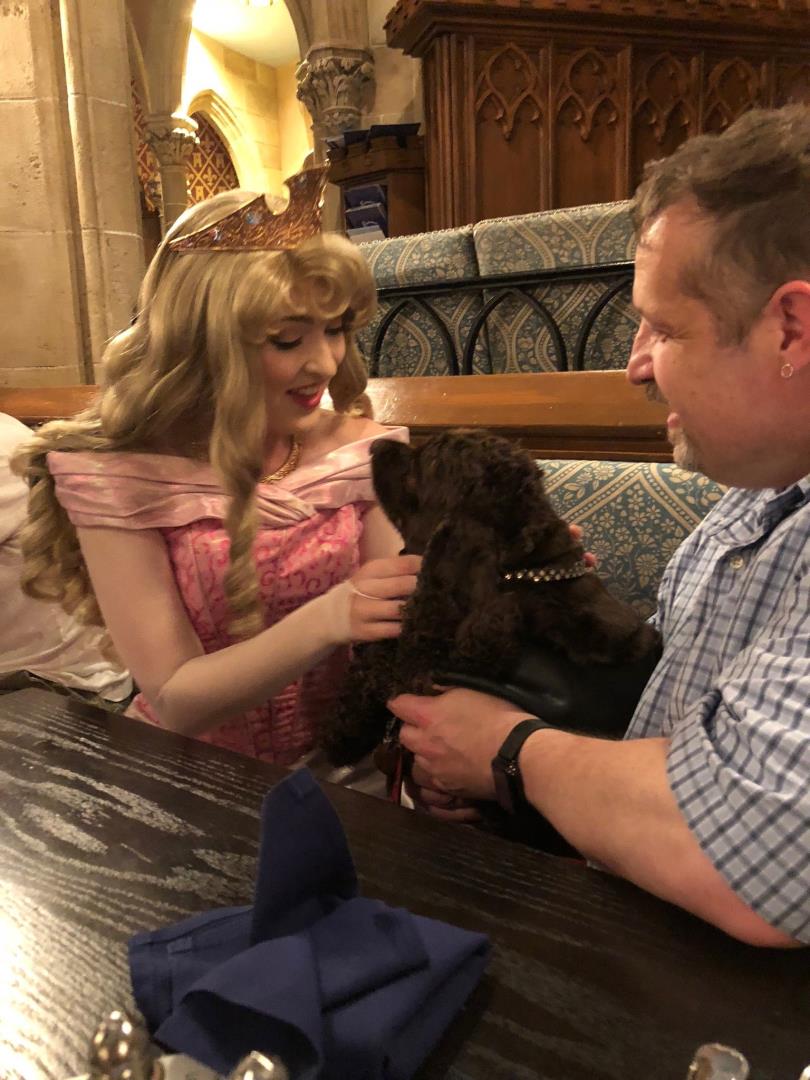 People with disabilities who use service animals cannot be isolated from other patrons, treated less favorably than other patrons, or charged fees that are not charged to other patrons without animals. In addition, if a business requires a deposit or fee to be paid by patrons with pets, it must waive the charge for service animals.
People with disabilities who use service animals cannot be isolated from other patrons, treated less favorably than other patrons, or charged fees that are not charged to other patrons without animals. In addition, if a business requires a deposit or fee to be paid by patrons with pets, it must waive the charge for service animals.
If a business such as a hotel normally charges guests for damage that they cause, a customer with a disability may also be charged for damage caused by himself or his service animal. Staff are not required to provide care or food for a service animal.
🐴 Miniature Horses
In addition to the provisions about service dogs, the Department’s revised ADA regulations have a new, separate provision about miniature horses that have been individually trained to do work or perform tasks for people with disabilities. (Miniature horses generally range in height from 24 inches to 34 inches measured to the shoulders and generally weigh between 70 and 100 pounds.) Entities covered by the ADA must modify their policies to permit miniature horses where reasonable. The regulations set out four assessment factors to assist entities in determining whether miniature horses can be accommodated in their facility. The assessment factors are (1) whether the miniature horse is housebroken; (2) whether the miniature horse is under the owner’s control; (3) whether the facility can accommodate the miniature horse’s type, size, and weight; and (4) whether the miniature horse’s presence will not compromise legitimate safety requirements necessary for the safe operation of the facility.
These photos are of Tasha attending Disney's Owner Summit, a yearly event for the top Authorized Disney Vacation Planner travel agencies in North America. Tasha is always well behave, except on the Safari where the lion let out a load roar. Tasha barked back a couple of times and he shut right. Everyone on the ride laughed.
For more information or to book your Vacation with your Service Dog Contact:































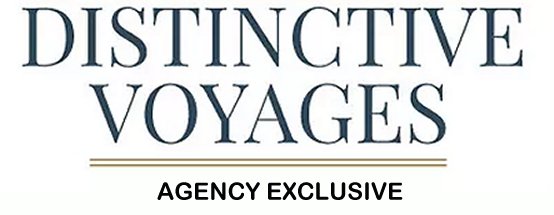



 Cruise Lines International Association
Cruise Lines International Association